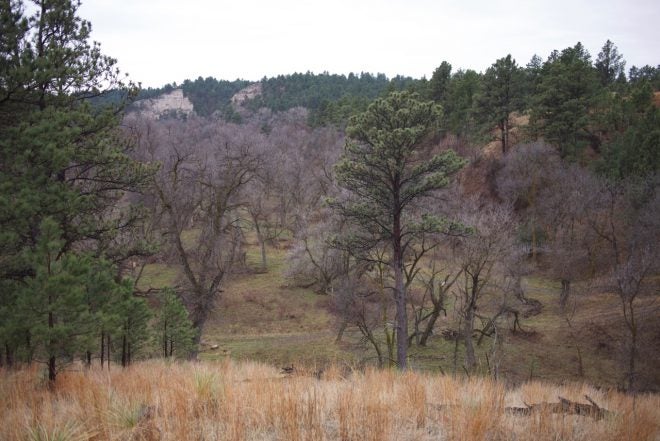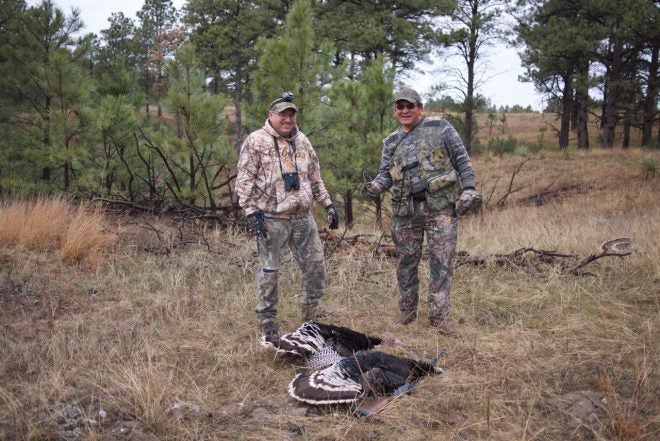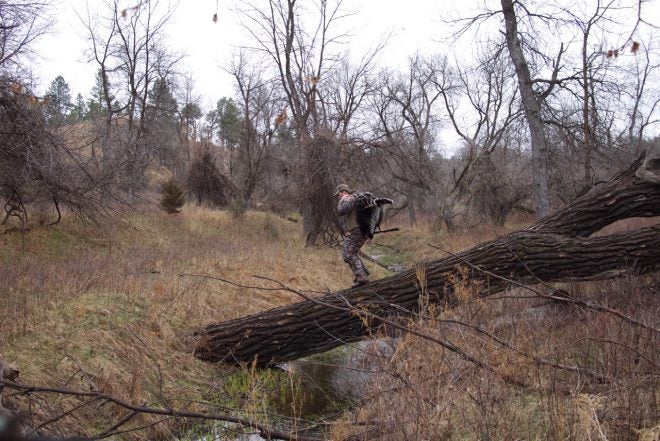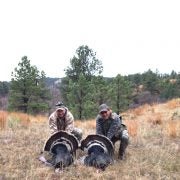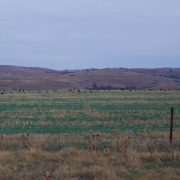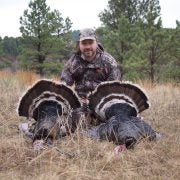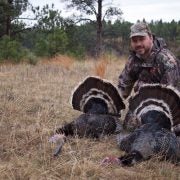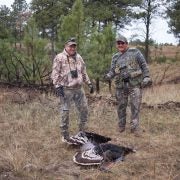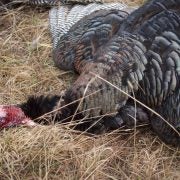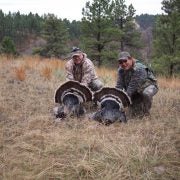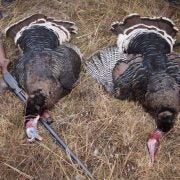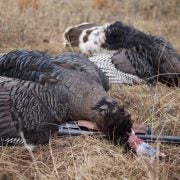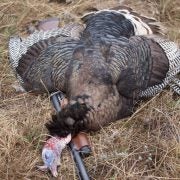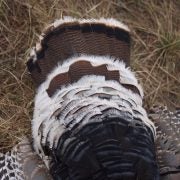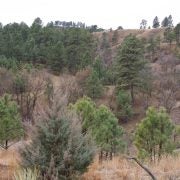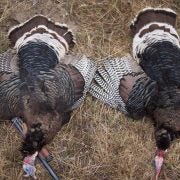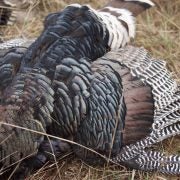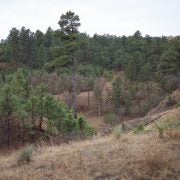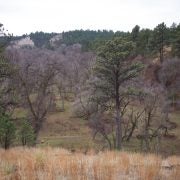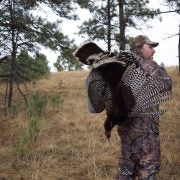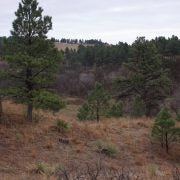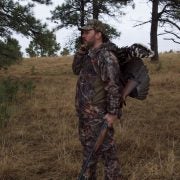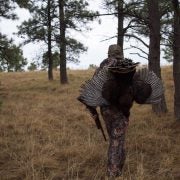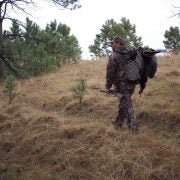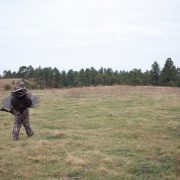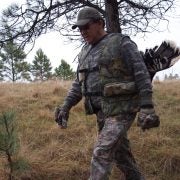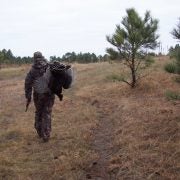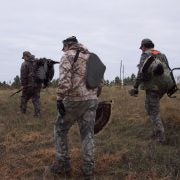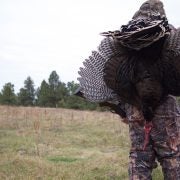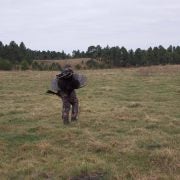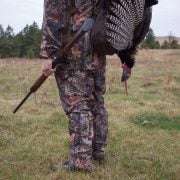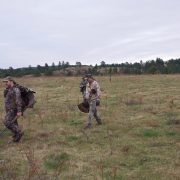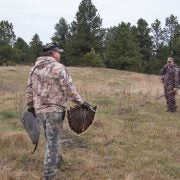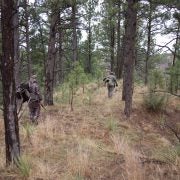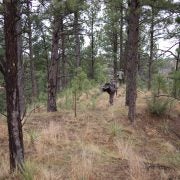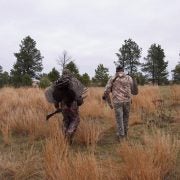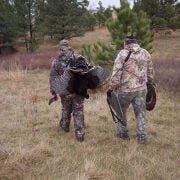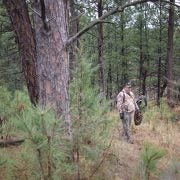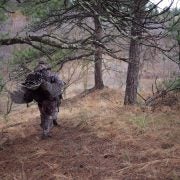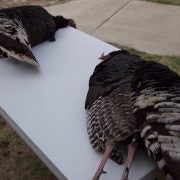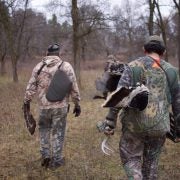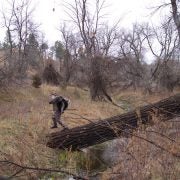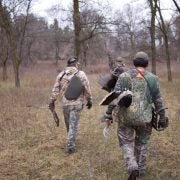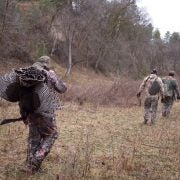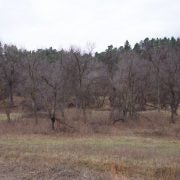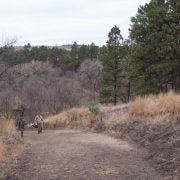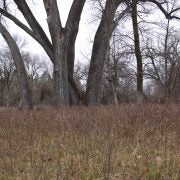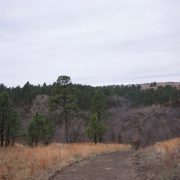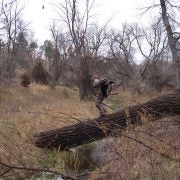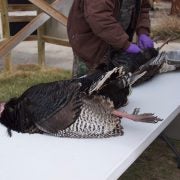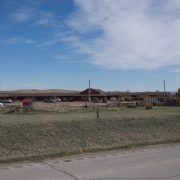Two Birds, One Shot: My First Turkey Hunt in South Dakota
Jon Stokes 04.24.17

April is “Get (Back) Out There!” month on AllOutdoor.com. Winter’s over, spring has sprung, and it’s time to gear up and to back outside. All month long we’ll be sharing our outdoors adventures with you, so follow along on the #GetBackOutThere tag.
Earlier this month I visited South Dakota’s Pine Ridge Indian Reservation for my first turkey hunt, and you can see from the picture above how it went. I’m smiling in between the two young toms I took down at about 30 yards with a single shot of 12 gauge Winchester Long Beard XR 3″ #6 turkey loads–the only shot I fired the whole trip. Also, the birds were on the run, and I was hustling after them when I took the shot.
I’ve since heard from my friends that this is not how one normally turkey hunts–charging over a ridge after a bunch of scared birds, blazing away with a shotgun, Call-of-Duty style. But I wasn’t about to let those birds get away, and the guides didn’t yell for me to stop.
But let me rewind a bit and tell you how I got worked up enough to charge a bunch of turkeys.
Turkeys Everywhere
Take a look at the picture below, all of those black dots out there in the field are turkeys–lots and lots and lots of turkeys. Only part of that flock of about 100 is visible in this shot, which was taken as we were driving away from the spot where we eventually gave up trying to lure the flock towards us.
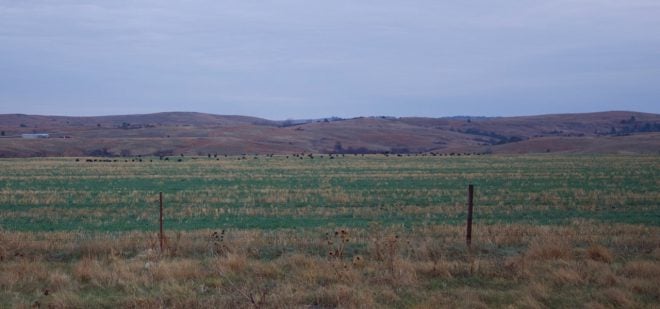
We arrived on the far side of that field before dawn, near those trees you can see in the distance at the base of the hills. The ground slopes down to a creek, and this massive flock was roosted about 200 yards from where we put out a decoy and sat down to start calling.
The birds came down from the trees and began closing a little bit of distance, and I found myself thinking that if I just had my rifle I could easily pick off a few of them. But I was toting a borrowed Remington 870 Express Magnum with an unknown choke that I hadn’t taken time to pattern before tossing it in the Pelican case and heading to the airport.
Using a decoy and a variety of calls, we tried to lure them within shotgun range. Unfortunately, the guide’s expert calls couldn’t compete with the very near-sounding coyote howls that erupted off to our left. When I heard the howling start, I thought to myself, “If I were a turkey, I’m out of here right now.” And that’s exactly what happened. The birds began picking their way across our field of view from left to right without coming any closer.
We tried to creep in on them, but there were three whitetails stalking across the field into the midst of the flock who suddenly noticed us, and that sealed our fate.
So, we bailed for another part of the reservation, one much more hilly, with cliffs and creeks running in the hollows. Like our previous location, this spot was chock full of gobblers, so we began calling a few in.
This time, three large toms and a bunch of hens were working the creek down below us, and at one point the two toms were fanned and dead in my line of sight about 70 yards out. Yet again, I thought, “if only I had my rifle.” But the ornery birds moved on, responding to our calls but not actually making their way over.
Next, we made our way down the hill closer to the creek, and struck up a call-and-response with another gobbler in the woods across the hollow. We couldn’t see him, but it was the same story: he responded to our calls, but wouldn’t move any closer. So, we headed back in the direction of the other flock that had taken a pass on us earlier.
We did a bunch of walking and creek crossing, and then some climbing up very steep slopes to find another flock, this one with an exceptionally large tom who was, yet again, within an easy 70-yard rifle shot of my position. And again, we couldn’t call them over.
Stumbling into a Flock
The guides didn’t get frustrated. Hey, the whole reservation is loaded with turkeys, so if one group doesn’t respond you just move on. But I was getting pretty tired of seeing all these birds and not shooting.
I grew up hunting on the Gulf Coast, and I’m used to stalking up on squirrel, rabbits, and even deer at times. I’ve even shot a number of squirrels while chasing them through the woods and across creeks with my .22 rifle raised, firing away the whole time (I don’t recommend this, by the way). So every time we let these birds get away because they won’t close 70 or so yards of distance, I’m thinking: why don’t these guides tell me to just sprint over there and start shooting? But what do I know? It’s my first hunt, so I held back on the sprint-and-shoot approach.
The guides preferred to just move on from a flock if it’s not responding. They talked about the birds “going sour” if they have a traumatic encounter with humans, and then fleeing any hint of human presence. Thus, the logic goes, better to move on and find another flock than “sour” the birds by shooting and missing. So we moved on, striking out in a new direction toward some distant gobbles.
At one point we were approaching a hilltop when one of the guides, Ivan Sorbel, Executive Director of the Pine Ridge Area Chamber of Commerce, stopped us and told us that he heard birds really close. I looked up, and I saw the heads of some hens poking up from the other side of the hill about 15 yards away, their bodies obscured by the hill and their heads visible through the hilltop grass.
It turns out there was a whole flock there, including at least three toms–one of them quite large–and the executive decision was made that we were just going to stalk in on them.
Ivan and I started moving silently in the lead, and by the time we crested the hill it was clear the birds were onto us and were starting to flee. I saw the toms move across my field of view headed up the hill, and I decided right then and there that I was going to get off at least one shot at them.
So I raised the shotgun to my cheek and started moving quickly up the hill toward the birds. I couldn’t get a clear shot, because the toms were going in and out of view through the grass as they scooted across the hill about 30 yards away. I was still moving with the gun on my cheek, trying to get a clear shot, when I saw the red head of one of the toms suddenly appear through a break in the grass.
I pointed the bead at the bird’s head and squeezed the trigger, and then I immediately racked another one in as I saw him go down. There were more feathers flaring than just that one bird, though, so I ran up, gun still raised, to take another shot at whatever was foolish enough to still be lingering.
It turns out I had taken down two of the toms with that shot. Success times two! My very first turkey, and it was a double.
Going Home
On the hike back I learned that my approach of bolting off toward the flock with my gun up and trying to maneuver myself into an open shot at birds on the run isn’t exactly standard turkey hunting procedure, but it worked so who’s complaining?
We hiked back via a different, much less steep route than the one we took up, and eventually made our way back to the truck, birds in tow.
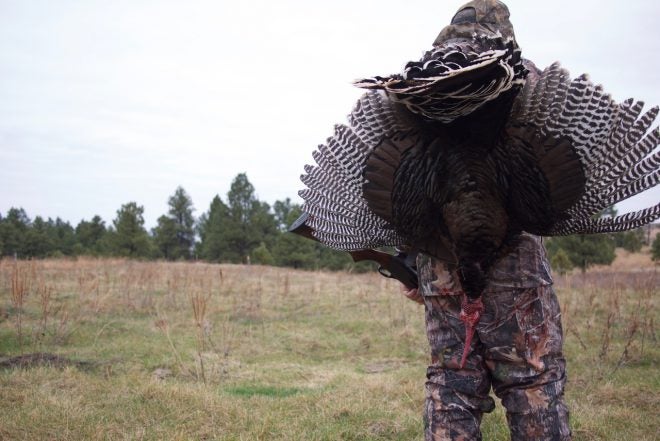
You can see from the pictures how nice the countryside is. The terrain in this area is really varied. You get everything from mesas and grasslands to hills and creeks. In all, it’s beautiful country. I’ll be posting more pictures from the trip, so stay tuned!
In all, it was an amazing trip, a really great hunt. The guides were extremely friendly and knowledgeable, and of course the reservation itself is so chock full of turkeys that I imagine the only way you’d go and not get anything is if you keep missing. I’ll definitely be back, and next time I’ll bring the family.
